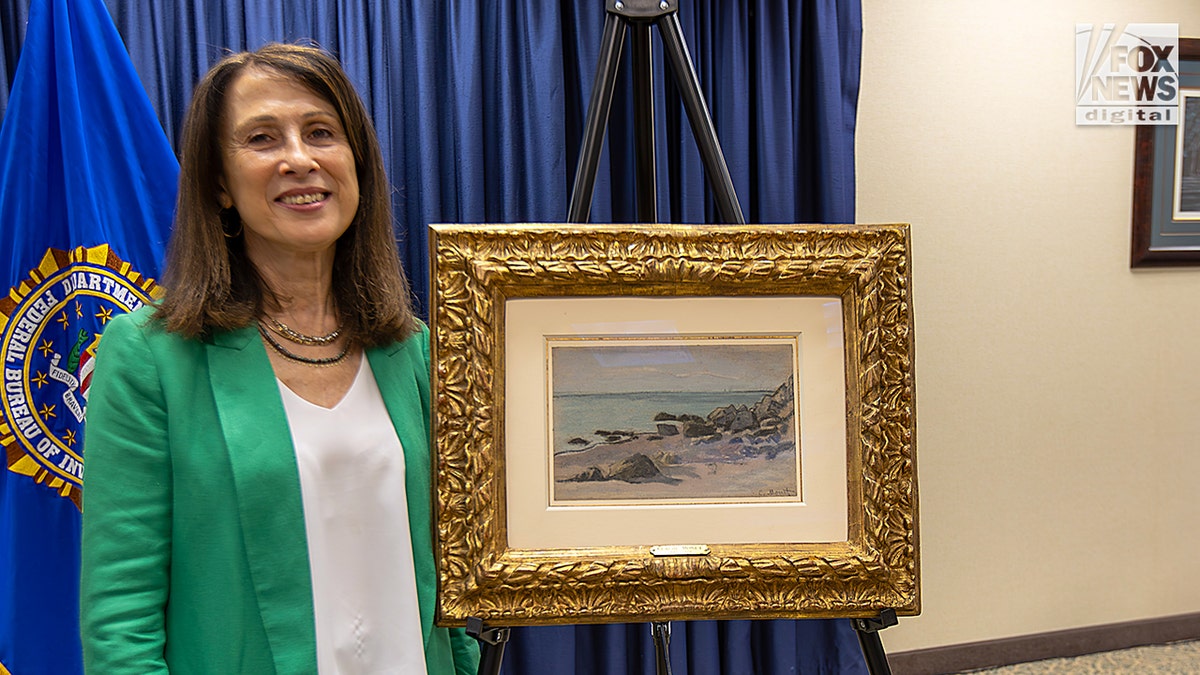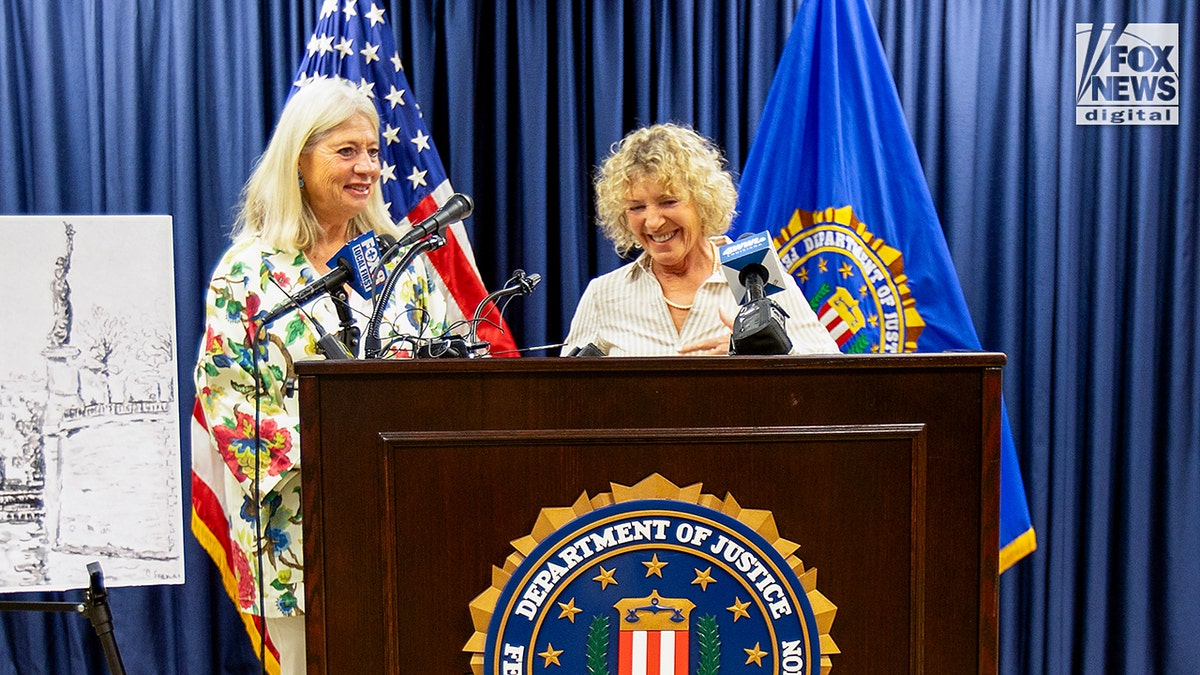
An early work by impressionist master Claude Monet was returned to the descendants of its rightful owner in New Orleans last week after it had been presumed lost during World War II.
The descendants, Helen Lowe and Françoise Parlagi, as well as the co-chair of the Looted Art Commission in Europe, Anne Webber, sat down with Fox News Digital to give exclusive interviews about their experiences.
“Bord de Mer,” an artwork dating back to 1865, depicts a beach in Normandy near Le Havre called Sainte-Adresse, liberated during the D-Day invasion by the Allied forces in 1944. The painting could be worth up to $700,000, according to Smithsonian Magazine.
“While this Monet is undoubtedly valuable, its true worth lies in what it represents to the Parlagi family,” James Dennehy, assistant director in charge of the FBI in New York City, said in a statement after the piece was returned to the family. “It’s a connection to their history, their loved ones, and a legacy that was nearly erased. The emotions tied to reclaiming something taken so brutally can’t be measured in dollars – it’s priceless.”
NAZI-LOOTED MONET, MISSING FOR OVER 80 YEARS, RETURNED TO HEIRS OF ORIGINAL OWNERS IN NEW ORLEANS: FBI
Monet’s early artwork, “Bord de Mer,” circa 1865, depicts a beach in Normandy, France, near Le Havre. (Kat Ramirez for Fox News Digital)
The painting was acquired by Adalbert “Bela” Parlagi in 1936 during an auction in Vienna, Austria. He and his wife, Hilda, ethnically Jewish, had to flee Vienna suddenly in 1938 after the Anschluss or “union” with Nazi Germany.
“Bord de Mer” was one of the countless artworks left behind by the Parlagis when they became refugees. The Parlagis ultimately moved to London and had their antiques and artworks, including the Monet, stored in a shipping container in 1938.
“On the course of their travels to London, they asked a shipping company in Vienna to pack up everything that was in their apartment. They literally closed the door and left it, so they asked him to pack up everything, including their artworks, and to take them into storage and then ship them to them in London,” Webber told Fox News Digital.
“But the Nazis had other ideas, and they, what they did was that they seized the property, and they confiscated it in 1940, and they put it up for sale in 1941 and 1942,” she said.
Adalbert Parlagi never gave up his efforts or his hope to recover “Bord de Mer” and his countless other artworks looted by the German Gestapo. He died in 1981.
“[Parlagi] wrote to the shipping company in Vienna. He wrote this to the Austrian government. He wrote to the Austrian Federal Heritage Office. He asked them all for help in identifying what had happened to all his possessions. The shipping company told him they’d been seized and auctioned,” Webber said.

Anne Webber is shown with Claude Monet’s “Bord de Mer,” which her research through the Looted Art Commission in Europe helped recover. (Kat Ramirez for Fox News Digital)
“He also made attempts to get compensation because there were also compensation procedures that were set up after the war, and both Germany and Austria denied him any compensation on the grounds that they didn’t know where his works of art were, and they had no evidence of what had happened to the Monet that the German Reich had taken,” Webber said. “All this was a typical experience of people after the war.”
After Adalbert’s death in 1981, his son, Franz, took up his father’s cause to recover his lost artworks. Franz attended the Washington Principles on Nazi-Confiscated Art in 1998, where 44 governments convened in Washington, D.C., to discuss the recovery of Nazi-looted cultural works.
Franz Parlagi died in 2012 without recovering “Bord de Mer” or any of the priceless works which belonged to his father.
‘AMERICAN GOTHIC’, FAMOUS PIECE BY ARTIST GRANT WOOD, IS DISPLAYED TO VISITORS AT THE ART INSTITUTE OF CHICAGO
Lowe and Françoise Parlagi, granddaughters of Adalbert Parlagi, approached the Looted Art Commission in Europe in 2014 to find the Monet piece. Webber compiled decades’ worth of research from around Europe on “Bord de Mer” and the countless other artworks owned by Adalbert.
In 2021, the Looted Art Commission presented their detailed research to the FBI’s Art Crime Team.
“We always put together a very comprehensive and detailed dossier of information and documentation showing all the evidence that the [Parlagi] family owned it, when they acquired the works of art, where they acquired them, the evidence of loss, the evidence of sale by the Nazis, the evidence of confiscation. We have the confiscation records,” Webber said. “So we put together all the evidence that there is. And at that point, we contacted the FBI.”
The Monet painting was discovered by the FBI in New Orleans with the Schlamp family in 2023 after having been purchased from M.S. Rau, an art dealer, in New Orleans. The late Dr. Kevin Schlamp and surviving wife Bridget Vita told Fox News Digital they were “shocked” to discover the work’s true provenance.

Granddaughters of Adalbert “Bela” Parlagi offer remarks of thanks and praise as they received their grandfather’s Monet pastel-on-paper “Bord de Mer” on Oct. 9 in New Orleans. (Kat Ramirez for Fox News Digital)
According to the FBI, “the Schlamps voluntarily surrendered the piece and relinquished their ownership rights. The Schlamp family’s cooperation was key to the successful resolution of this case, and their integrity in ensuring the pastel’s return is highly commendable.”
In May 2024, a judge for the U.S. Court for the Eastern District for Louisiana handed down the ruling that “Bord de Mer” legally belonged to Lowe and Françoise Parlagi, with power of attorney going to Webber.
On Oct. 9, both the Schlamp and Parlagi families met in person at the FBI New Orleans field office as “Bord de Mer” was formally repatriated to the descendants of Adalbert Parlagi.

“Bord de Mer” is unveiled for the first time to the public after it was believed to have been lost after the Nazis looted the Monet piece during World War II. (Kat Ramirez for Fox News Digital)
“We are proud to support the work of the Art Crime Team, especially in this case,” Special Agent in Charge Lyonel Myrthil of FBI New Orleans said in a release. “Nothing can excuse the hateful and heinous behavior of the past, but we are most grateful to the Schlamp family for their role in righting this wrong. We need and appreciate the ongoing support of the public and the art community at large to ensure there are more success stories like this in the future.”
Webber said she is proud of the work this multi-decade, multi-continent team has accomplished but urged the world to take notice of the countless lost cultural treasures from World War II.
“It’s very important that we all as humans have these rules that we act by,” she said. “We have conventions on human rights. We have, we say that, you know, property belongs to the people who own it and that they have a right to equal possession of it. And those were written into the conventions that the Americans and the British enacted after the war and that we saw at the Nuremberg war trials.
CLICK HERE TO GET THE FOX NEWS APP
“These were crimes against humanity. So they’re very important today, whether you’re in Britain or whether you’re in America, whether you or the family live in Switzerland and in Spain, wherever you are. This is very, this is all very important today. It couldn’t be more important than it was today than it was in the past.”





